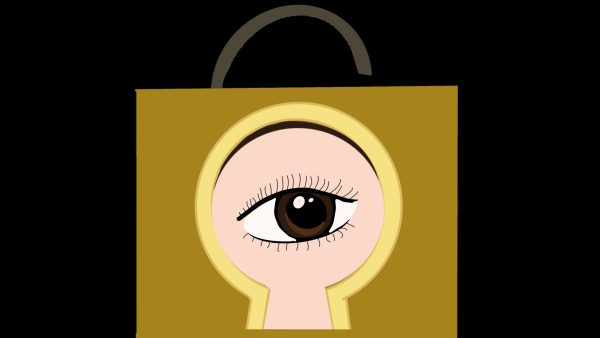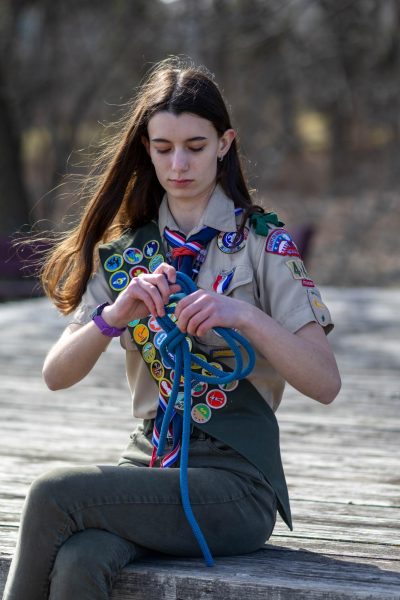Why I will never watch “Blonde”
The ethics of biopics is a widely talked-about debate among the film community. Opinions Editor Lizzie Lively gives her take on the harmful messages portrayed in Marilyn Monroe’s recent Netflix biopic, “Blonde.”
Digital illustration of Marilyn Monroe.
I will never see the Netflix movie “Blonde,” nor will I ever read the 738 paged work of “biographical fiction” by Joyce Carol Oates that the movie is based on. Both, while using Marilyn Monroe’s name, do not honestly tell her story, and it is disheartening to see how well both the movie and book have done.
“Blonde” is a fetish film that romanticizes female pain and suffering and the director of the film, Andrew Dominik, even said so himself. In an interview with the British Film Institute, Dominik said the film is a sexual fantasy.
“The film is a rescue fantasy. We feel we have a special intimacy with her character,” Dominik said. “That’s the attraction to Marilyn, that feeling that we’re the only ones who understand. That we could have saved her somehow. And maybe the flipside of that is a punishment fantasy, or a sexual fantasy.”
In the same interview, Dominik claimed he was not interested in portraying her as human. He disregarded Monroe’s accomplishments like her production company or her public opposition to the communist witch hunts, instead favoring the dramatics of never confirmed affairs and sexual violence.
“That stuff is not really what the film is about. It’s about a person who is going to be killing themself,” Dominik said.
Dominik does not care that Monroe is more than her tragedies. He does not care about the complexity of a real woman who suffered, but rather views her story as a vessel for his own fantasies.
“OK, she wrested control away from the men at the studio, because, you know, women are just as powerful as men,” Dominik said. “But that’s really looking at it through a lens that’s not so interesting to me.”
Of course the male director is only interested in Monroe’s pain and suffering. Of course the male director would want to inject his own fetishes and agenda into his film.
In the movie, Monroe goes through two forced abortions, despite there being no evidence that Monroe ever got an abortion according to historian Michelle Vogel.
“Any talk of pregnancy termination is an assumption on our part,” Vogel said. “Marilyn loved children and she was desperate to be a mother. Sadly, she never carried a baby to term.”
Despite this, in the movie Monroe is depicted talking to her CGI fetus, which asks, “You won’t hurt me this time, will you?”
Watching Monroe’s image be distorted this way is bitterly ironic. Dominick twists her image into an anti-abortion propaganda when Monroe desperately wanted children.
The national director of arts and entertainment engagement at Planned Parenthood, Caren Spruch, released a statement about the impact of this scene post overturning of Roe V. Wade. Spruch said this depiction of an abortion stigmatizes it and perpetuates misinformation about reproductive healthcare.
“As film and TV shapes many people’s understanding of sexual and reproductive health, it’s critical these depictions accurately portray women’s real decisions and experiences,” Spruch said. “While abortion is safe, essential health care, anti-abortion zealots have long contributed to abortion stigma by using medically inaccurate descriptions of fetuses and pregnancy,”
Spruch added that reproductive healthcare like abortions should be portrayed more sensitively and accurately.
“We still have much work to do ensure that everyone who has an abortion can see themselves on screen,” Spruch said. “It is a shame that the creators of ‘Blonde’ chose to contribute to anti-abortion propaganda and stigmatize people’s health care decisions instead.”
In response to this, Dominik said audiences were projecting onto his movie in an interview with The Wrap.
“I don’t think the movie is anti-pro choice. I don’t think it is at all,” Dominik said. “And I’m not convinced that she actually wants to have a baby. I think she has feelings about not having a baby, but I’m not convinced that what she’s doing – I mean, she doesn’t end up having one. […] There’s a wish for [a] baby but there’s a fear of [a] baby, and I think that’s kind of the central stressor on her.”
Despite historians and healthcare professionals telling him that he is wrong in multiple ways; Dominik persists, using the image of an already exploited woman to further his own agenda. Dominik does not care about presenting a true Marilyn Monroe story exploring the complexity of her life, but rather presenting her story as a factless fetish film full of female pain and suffering. Dominik even says so himself in an interview with Screen Daily.
“It’s an NC-17 movie about Marilyn Monroe, it’s kind of what you want, right?” Dominik said. “I want to go and see the NC-17 version of the Marilyn Monroe story.”
In the aforementioned interview with the British Film Institute, Dominik also said he does not care if people do not know his film is fictionalized. This is a man who took a successful woman’s traumatic life and exploited her just like countless others have done in her life and after her death.
“Blonde” and its creator’s problematic comments also raise a question about biopics in general and the dramatization of real traumatic stories, specifically another Netflix show: “Monster: The Jeffrey Dahmer Story.”
In an interview with Independent, Anne E. Schwartz, the journalist who originally broke the story of the Dahmer case, discussed the discrepancies between the show and real life, adding that the dramatization makes it more watchable for audiences.
“I had trouble with buy-in, because I knew that was not accurate,” Schwartz said. “But people are not watching it that way, they’re watching it for entertainment.”
The families of Dahmer’s victims were not happy with the show at all. Rita Isbell, the sister of one of the victims, was frustrated that she had not been contacted about the show. In a piece with Insider, Isbell said the show re-traumatized her after it showed a re-making of her emotional court testimony.
“It felt like reliving it all over again. It brought back all the emotions I was feeling back then,” Isbell said. “I was never contacted about the show. I feel like Netflix should’ve asked if we mind or how we felt about making it. They didn’t ask me anything. They just did it.”
Isbell discussed the intentions behind the show, sharing that she believed Netflix is in it for the money.
“It’s sad that they’re just making money off of this tragedy. That’s just greed,” Isbell said.
Netflix is exploiting tragedy and senseless violence for the sake of profit without realizing the impact their exploitation has.
This is not the first time, nor is Netflix the only culprit. There is a difference between education through film and factless dramatized “biopics” and that difference is essential to know. Read between the lines, listen to those affected by these greed projects, and educate yourself on the true impact of biopics.
I will never watch “Blonde” just like I will never watch “Monster: The Jeffrey Dahmer Story” or any of the other exploitative “true stories.” You should not, either.

Lizzie Lively is the Opinions Editor for “The Express.” She is a senior and this is her third year on staff, having previously served as a writer. Outside of “The Express,” Lizzie is involved with theater and outside of school, Lizzie works as a server for Jose Pepper’s. In her free time, she enjoys hanging out with friends, thrifting, listening to music and watching her favorite movies and TV shows, including “Love And Human Remains,” “Say Anything” and “Serial Experiments Lain.”

Sabrina San Agustin is a senior and the Design Editor for “The Express.” This will be her second year as Design Editor and third year on staff. Outside of newspaper, Sabrina is part of NHS, NSHS, NEHS, Quill & Scroll, and she is a board member for NAHS. Sabrina also owns her own business where she sells her art online. In her free time she enjoys spending time with family, reading new books and watching her favorite movies. Sabrina is very excited to return to the role of Design Editor and can’t wait to help tell stories through art and design.











